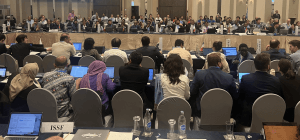
BANGKOK, Monday 20th May – The 28th Indian Ocean Tuna Committee (IOTC) meeting has ended with mixed results. While some strides were made in sustainable fishery management for skipjack and drifting fish aggregating device (dFAD) management, the lack of consensus on yellowfin tuna catch reductions remains a deep concern for the Global Tuna Alliance (GTA) Partners.
Despite persistent calls by GTA’s Partners and the WWF for a 30% reduction in yellowfin tuna catch to allow stock recovery, the IOTC has yet again failed to reach an agreement on this crucial issue.
Daniel Suddaby, Executive Director of the GTA, expressed his disappointment:
“That is 9 years of talk and no action, 9 years of ignoring scientific advice. What will it take to drive change?”
“This yellowfin issue is serious,” said Kerrie Robertson, GTA’s Advocacy Lead:
“The stock is declining and continued inaction is a huge concern to GTA Partners, who are immensely frustrated, with many having already stopped sourcing yellowfin from the Indian Ocean. Our alliance will consider our actions as this situation cannot persist unchecked. We simply cannot achieve sustainability if the IOTC does not take action.”
While the yellowfin outcome – or lack of it – is nothing short of disappointing, the GTA acknowledged that the IOTC had made genuine progress on drifting fish aggregating device management and skipjack management improvements. “This is a very welcome, substantial reform to FAD management in the IOTC,” said Kerrie Robertson.
Looking Forward:
The GTA remains committed to advocating for responsible fishery management. “We will be seriously considering our next steps on this issue,” said Kerrie. “Our Partners’ commitment to sustainable tuna sourcing does not waiver, and we will continue to amplify their united voices calling for effective measures for adoption at the next IOTC session.”